Photos show how common baking mistakes can drastically change your gingerbread cookies
Rachel Askinasi

- I made gingerbread cookies from scratch and messed up several times along the way (on purpose!) to see how each mistake would affect the texture, taste, and look of the cookies.
- From doubling up on molasses to using too much flour, there is a lot that can go wrong.
- Forgetting the molasses resulted in a crumbly cookie that was light in color.
- Combining all ingredients at once created lumps in the finished product.
I've become familiar with the myriad failures that are possible when it comes to baking from scratch. I've (purposely) messed up dozens of batches of chocolate-chip cookies, banana bread, brownies, pumpkin pie, and more, all while trying to nail down what each mistake would do to the finished product.
In the spirit of the wintertime holidays, I tried my hand at gingerbread cookies for the first time.
For consistency, I used the same Martha Stewart recipe I found online and a single gingerbread person cookie cutter for each batch.
From adding too much molasses to forgetting the egg, here's what happened when I made 14 classic mistakes while baking gingerbread cookies.
Packing my flour made for a crumbly cookie.
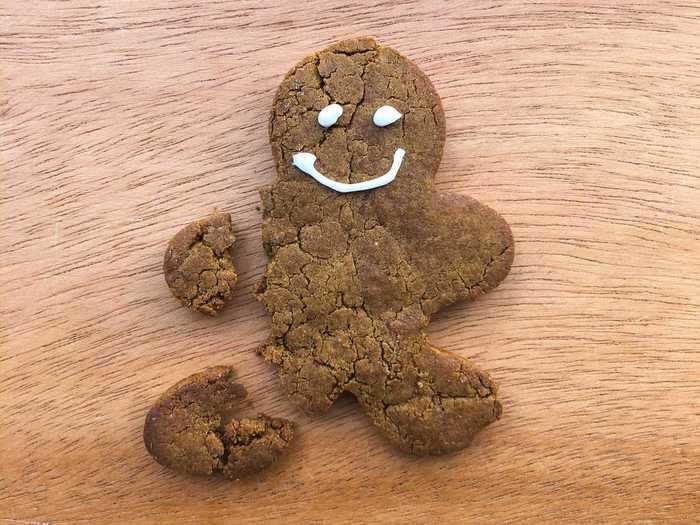
I was able to tell just from looking at the batter that this would be a crumbly cookie. It was difficult to roll out the dough without it falling apart instantly. I kept forcing the crumbs into a pile, pressing them down, and rolling them out again to get just a handful of bakeable cookies.
After baking, the cookie people came out hard and crunchy with broken limbs. But they weren't so hard that I thought I'd break a tooth biting into them.
Plus, they tasted great. The salt and spices came through in the flavor profile without being too overwhelming.
My cookies turned into sad dark blobs when I didn't use enough flour.
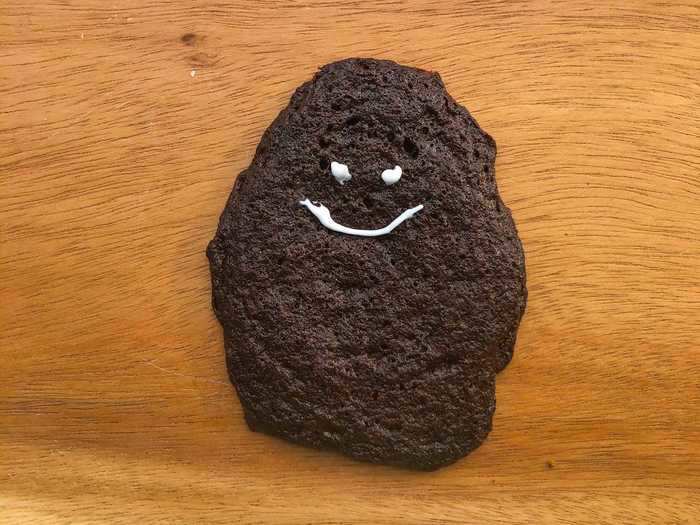
After biting into one of these, I realized the color was more from the lack of flour than from the char factor. Sure, they were a little burnt. But they were also loaded with molasses and dark brown sugar at an improper ratio to the flour, which explains how dark they were.
Though its color was completely wrong, the cookie was extremely light in weight. It broke apart easily in my hand and crumbled between my teeth.
The spices hit really hard with this batch. I felt the pepper and ginger in the back of my throat for several minutes after swallowing.
Leaving out most of the sugar created a more salty cookie.
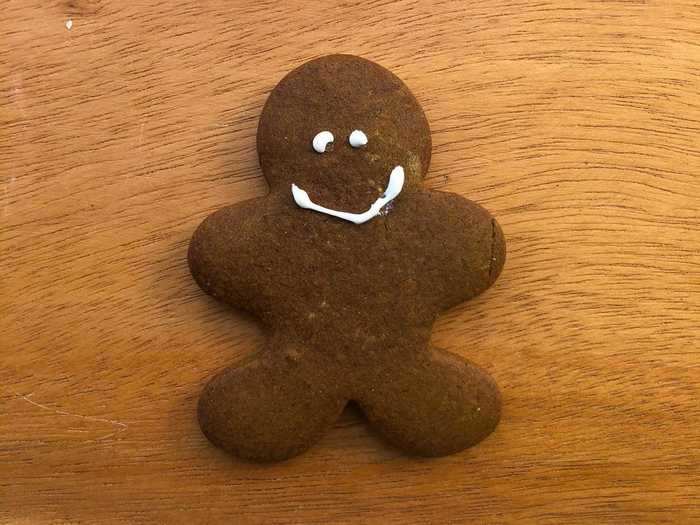
This cookie had the consistency I would hope for from a baked good like this one. It was firm but not hard, and dry but not crumbly. The shapes were consistently perfect cut-outs and each cookie had an even cook all around.
With a lack of sugar, the salt was able to shine. There were notes of spice lingering on the roof of my mouth and on my tongue, but not in an offensive way.
They were also lighter in color than some of the other cookies.
Extra sugar made this cookie way too hard.
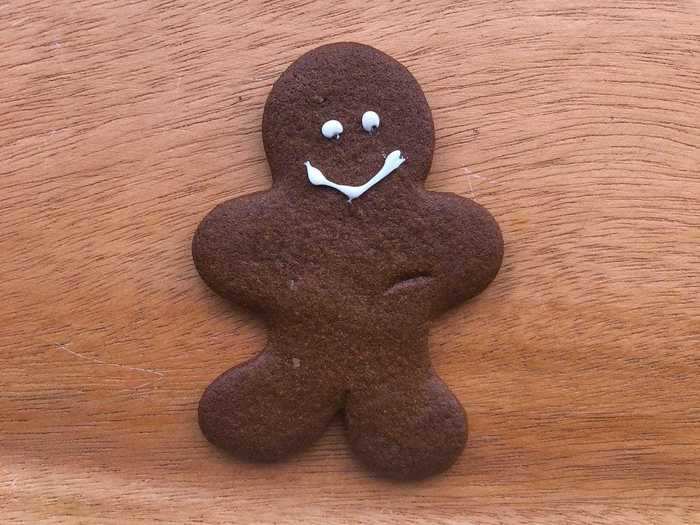
The batter for this batch wasn't too sticky, but there was some lag when I lifted each gingerbread person out of the rolled dough and onto my baking sheet. Some stretched out at the arms and legs.
As was expected because of the extra brown sugar, this cookie looked dark in color and took on the texture of molasses.
I thought I was going to chip my tooth when I bit into this finished, extra-sugary cookie. It was hard and dense throughout.
The flavor was mostly sweet on first bite, but as I continued to chew it became spicier.
There were cracks in my cookies made with too little butter.
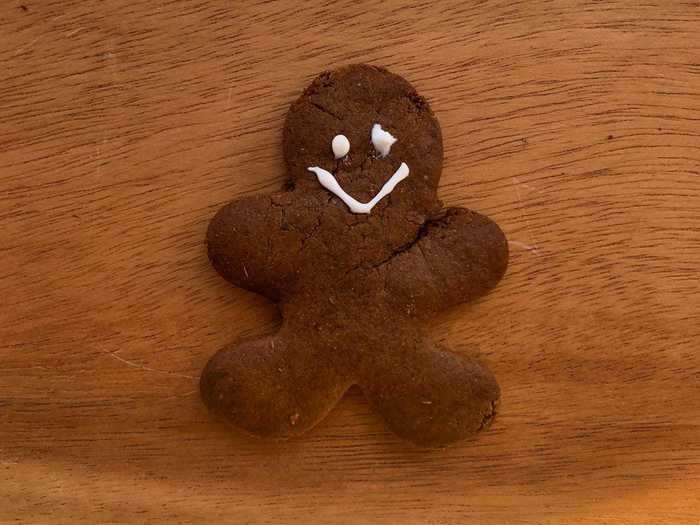
The dough was mostly dry but sticky in some places, which made for inconsistencies in the cookies. Once baked, they were visibly dry and cracked, but I noticed they were soft when I transferred them onto a cooling rack.
Biting into a cookie, I thought it tasted stale. It was slightly hard on the outside but had a more chewy center that reminded me of graham crackers that had been left unwrapped overnight.
I was really able to taste the cinnamon and cloves in this batch, though, which was a nice touch.
Too much butter made for sticky dough, but delicious cookies.
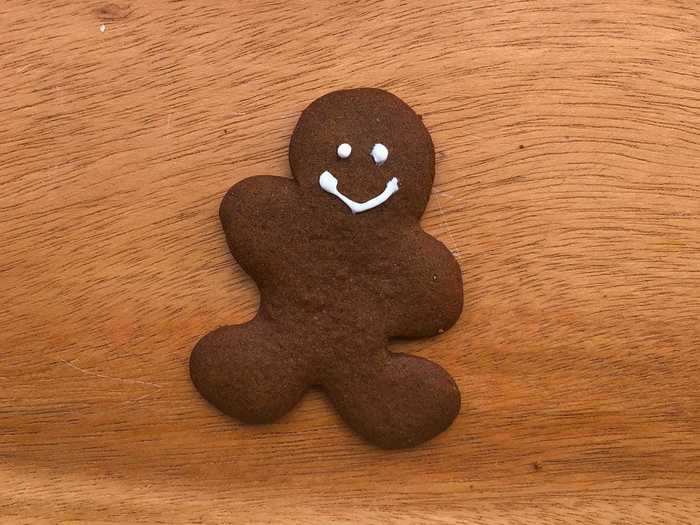
I had to use a spatula to lift these people-shaped cutouts from my flour-dusted countertop and onto a baking sheet. The dough was sticky, which resulted in slightly swollen cookies, but the finished product was nearly perfect.
Each flavor — sweet, salty, and spicy — was well-balanced and the texture was crunchy but not hard.
The cookies were easy to bite into and every piece fell apart in my mouth. The worst thing that doubling the butter did was slightly affect the shape of my cookies, but I'd rather that than a hard spicy cookie overall.
Doubling the egg made my cookies look bloated.
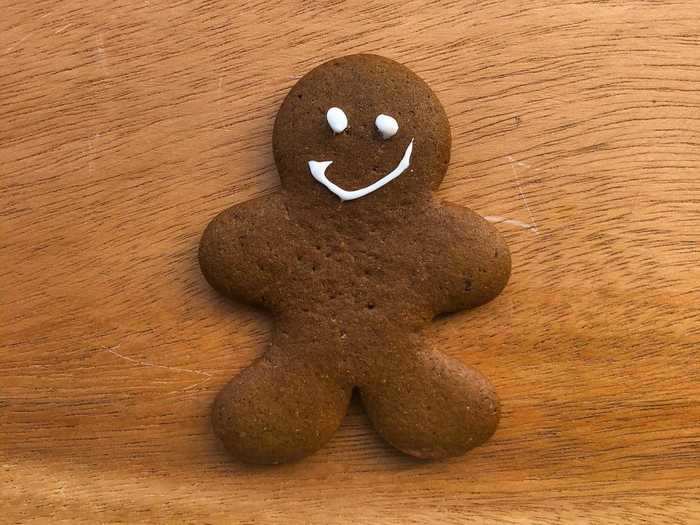
I used two times the called-for amount of egg for this batch and found that the moisture created an über-sticky dough. The dough was hard to work with and I had to use a lot of flour to keep it from gluing itself to my countertop.
Though these cookies looked slightly inflated, they were still crunchy and dense.
Adding an extra egg also brought out the saltiness of the cookies.
It was hard to roll out the dough when I forgot the egg.
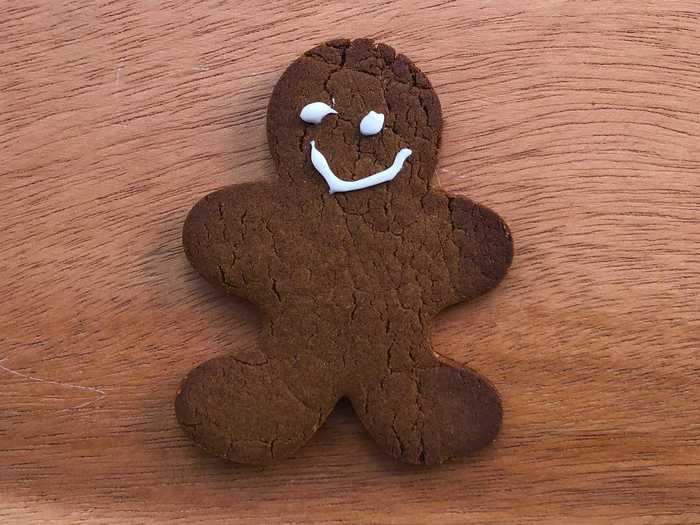
This batch was difficult to roll out successfully. The dough was dry and crumbly, and it frequently fell apart.
Each gingerbread person had several cracks running throughout its body.
After baking, the cookies darkened significantly in color and were almost completely dried out. They were hard to bite into and I found myself checking on my teeth after each bite to make sure nothing broke off.
The flavors here were salty and spicy, but the salt was the more prominent of the two.
I got a speckled cookie when I ignored the recipe instructions and mixed all ingredients at the same time.
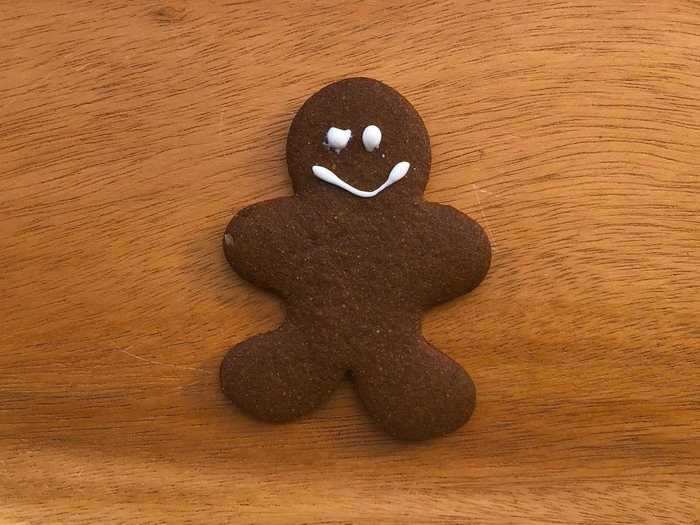
The recipe instructs bakers to sift the flour, baking soda, and baking powder together first. Next, it says to cream the butter and sugar together, then add the spices, bring in the molasses and egg, and finally fold in the flour mixture. It's a lot of steps, so I wanted to find out what happens when you throw caution to the wind and dump everything in at once.
I was able to easily roll out the dough, cut it into shapes, and successfully transfer it to my baking sheet.
These cookies weren't too badly affected by this mistake. Though they were hard in texture and dark in color, the flavor profile was spot-on. They were a bit harder than some of the other cookies but still edible.
I swapped the measurements for baking powder and baking soda, but it didn't make much of a difference.
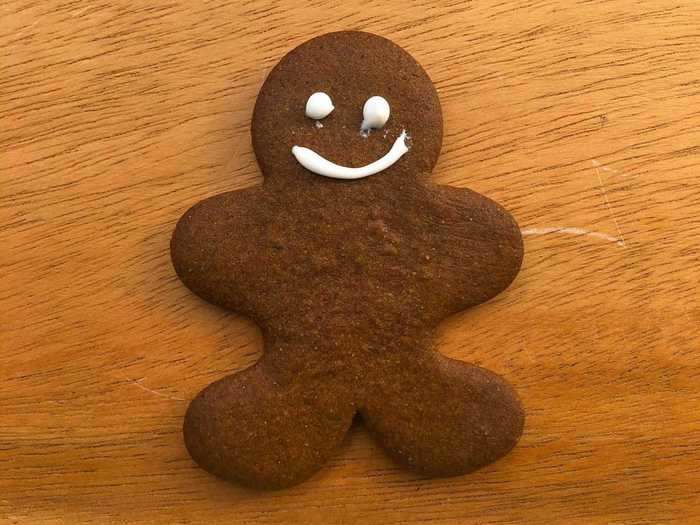
Stewart's recipe calls for different amounts of baking powder and baking soda. Mistaking those two ingredients for one another is a common and understandable mistake, so I swapped the amounts of each in this batch.
Nothing really happened to the way they tasted — the cookies were a pleasant balance of salty and spicy.
Though this mistake didn't change the flavor of my cookies, it did seem to affect their aesthetic — they didn't rise as much as some of the others, resulting in a flatter cookie.
I iced this cookie straight out of the oven and the face started to melt.
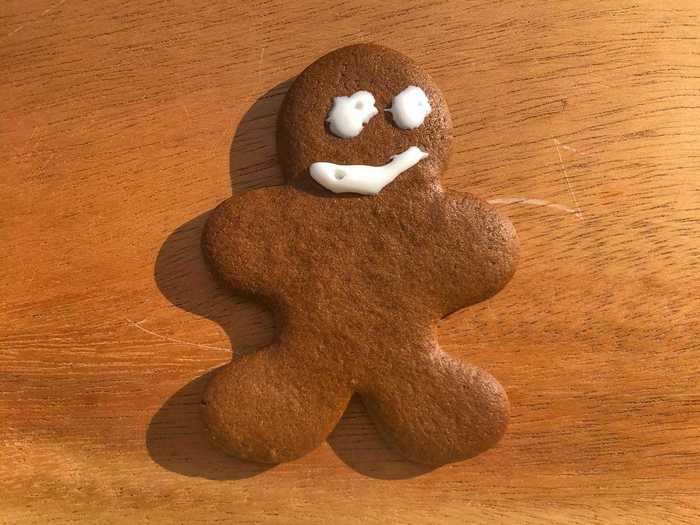
Since I followed the recipe in terms of ingredients for this batch, it tasted like a classic gingerbread cookie. There was a little spice and a lot of crunch. The cookie was mostly smooth and it held its shape in the oven.
Stewart's recipe clearly states that the baker should let cookies cool completely before icing them. But what if you're baking just before your party or contactless cookie swap and you don't have time to let them cool?
If that's the case, I would recommend leaving your cookies undecorated, because having no decoration beats this melty one any day of the week, in my opinion.
I skipped this batch's one hour of refrigeration time before cutting and baking, but it didn't make too much of a difference.
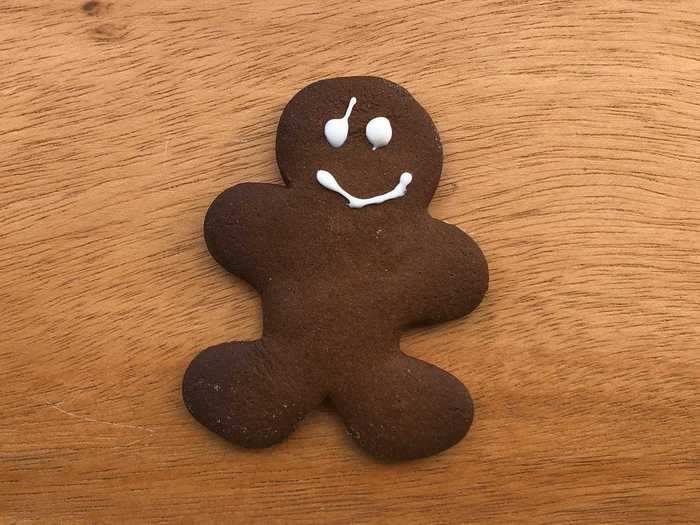
According to Stewart's recipe, the finished dough is supposed to chill in the refrigerator for at least one hour before going into the oven. Again, thinking about anyone who may not have the time (or frankly the patience), I skipped this step.
The dough was a little harder to deal with as I was cutting because it was mushier and stickier than some of the others.
This batch of gingerbread people wasn't uniformly shaped, but they weren't severely misshapen either. Some cookies had an arm or a leg that was a little stretched out. Others had a slightly oblate head. Overall, though, they each looked and tasted like true gingerbread people.
Doubling up on molasses softened the cookies significantly.
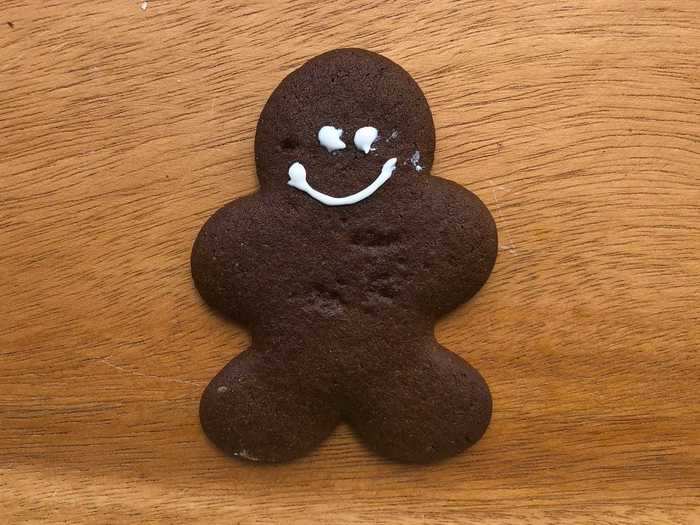
Molasses is a thick, goopy ingredient, so it wasn't a surprise that my dough came out on the stickier end of the texture spectrum when I used too much molasses. Even though it was thick, I was still able to form each cookie successfully with the person-shaped cutting tool.
Once in the oven, the gingerbread people started to swell and puff up around the edges.
Molasses is also extremely dark in color, so this batch of cookies turned out to be a deep brown.
While most of the batches came out hard and crunchy, this cookie was bendable toward the middle. It had slightly crunchy edges but was mostly soft.
I was able to taste the intense, semi-sweet flavor of the molasses, but also the spice that came from the black pepper and ginger.
On the flip side, leaving out the molasses left me with a dry, crumbly, light-colored pile of cookie crumbs.
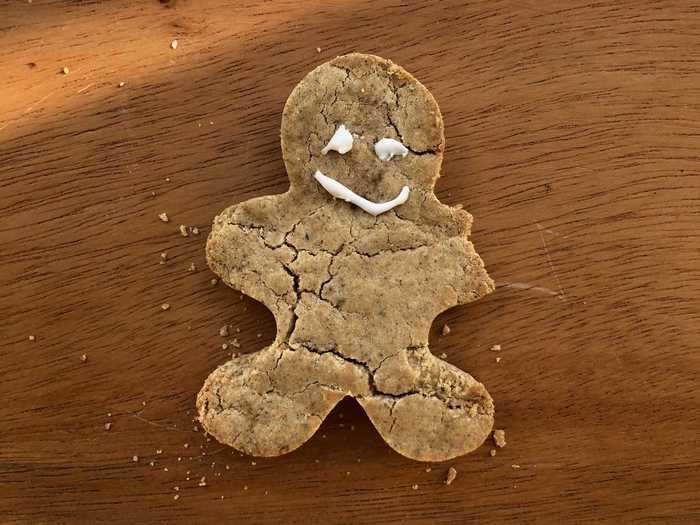
No, you can't just leave out the molasses from this recipe if you don't have any on-hand.
This dough was nearly impossible to work with. Instead of rolling it out, I had to pack it tightly and flatten it with my hands before forcing the cookie cutter into it. The only way I could successfully transfer it to my baking sheet was by using a spatula and packing the mold tightly with a lot of dry crumbs.
Each cookie darkened slightly in the oven, but not by much.
Once baked, they crumbled with the slightest touch and had virtually no flavor at all.
Even the smallest mistake can cause major changes in your gingerbread cookies.
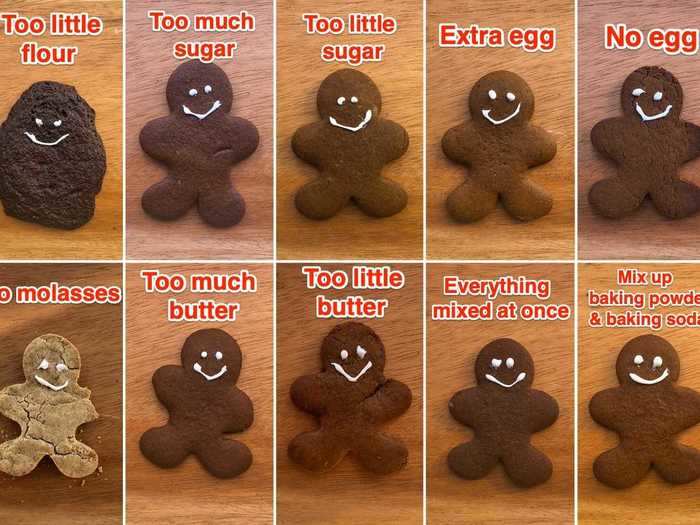
Gingerbread cookies are a massive undertaking for any home cook, so take care to follow your recipe to a T if you know you like the way they turn out.
But if you're like me and aren't a fan of the classic crunchy texture, you can try messing around and doubling up on butter or molasses, which will make for a softer cookie. If you're into a saltier cookie, try leaving out most of the sugar.
I was surprised by how drastically my cookies changed by even slightly altering the amount of dark brown sugar I used.
Even though I figured out how I like my gingerbread cookies, my main takeaway from this whole experiment is that I can now confidently say I am terrible at icing cookies.
- Read more:
- Photos show how common baking mistakes can drastically change your chocolate-chip cookies
- A graphic shows how pumpkin pie looks when you mess up the recipe
- Photos show how a hard-boiled egg looks depending on how you cook it
- Photos show how common baking mistakes can drastically change your banana bread
This is an opinion column. The thoughts expressed are those of the author(s).
READ MORE ARTICLES ON
Popular Right Now
Popular Keywords
Advertisement